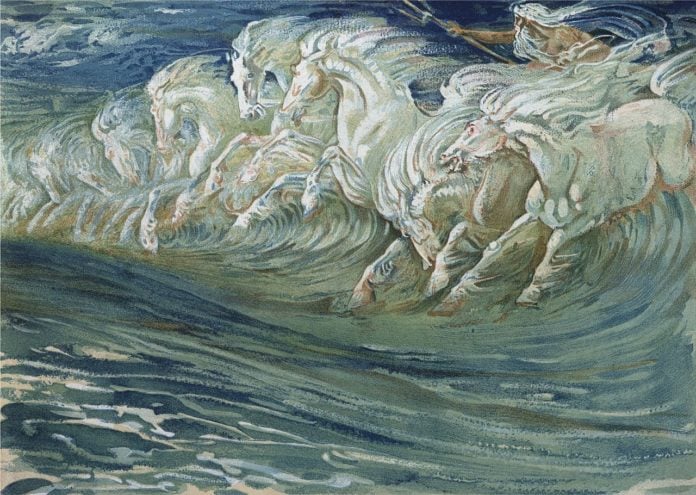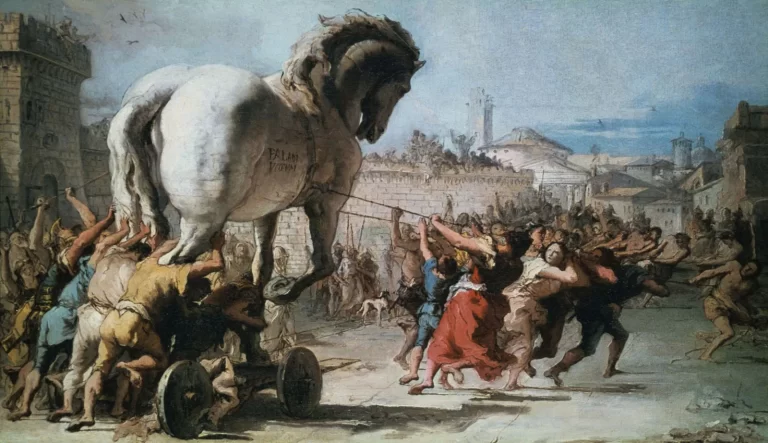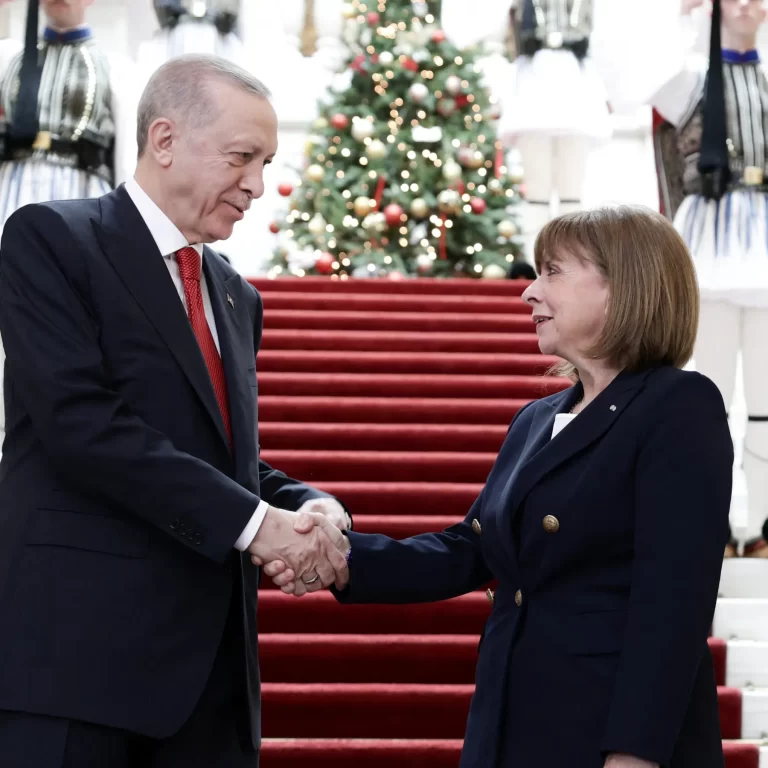The main thing that ancient Greeks and Vikings had in common was their love of the sea. Both were seafaring peoples, yet the former were traders and explorers, while the latter were mostly plunderers.
In regards to Greek versus Norse mythology, both cultures had polytheistic gods, and they also had one god who was above all others. Zeus was the ruling god for Greeks, and Odin was the king of the Viking pantheon.
The ancient Greek and Viking pantheon had great similarities, too. Both cultures had gods of war, goddesses of fertility, gods of the sea, or messenger gods. There were gods representing all facets of human life and nature.
Both peoples were also skilled in the art of war. However, ancient Greeks had organized armies with sophisticated tactics and weapons. Vikings, on the other hand, were mostly ferocious warriors overwhelming the enemy.
The Viking Navigators
Ancient navigators like the Greeks mostly sailed safely with an eye on land. Vikings had the ability to sail to open seas far off from land as they searched for new lands to plunder. This ability astonished their contemporaries.
The Vikings had a rich marine tradition spanning centuries. They had acquired knowledge of coasts, sea currents, and noted navigation marks. Scholars attribute this to their use of the five senses and intuition.
They could identify where whales were feeding, mark strangely shaped rocks, and hear seabirds calling in certain spots. Among other things, they knew if waves broke on shore or rocks.
The Vikings utilized rudimentary navigation tools such as a plumb bob to determine water depth or a wooden sun compass with multiple lines scratched on the edge. The skilled Norse seamen sought to find new lands to exploit.
Later historians called this the Viking Expansion. Njörd was the Norse god of seafaring and prosperity; for the Vikings, seafaring was the means to prosperity. They sailed most of the North Atlantic, reached south as far as North Africa and east as far as Russia, and sailed through the Mediterranean all the way to Constantinople and the Middle East.
To the west, the Vikings reached North America and set up a short-lived settlement in present-day L’Anse aux Meadows, Newfoundland, Canada.
There were longer lasting and more established Norse settlements in Greenland, Iceland, the Faroe Islands, Russia, Ukraine, Great Britain, Ireland, and Normandy.
Essentially, the Vikings acted as looters, traders, colonists, and mercenaries. Their motivation has been a topic of debate among historians.
One motivation for the Viking Expansion was finding wives and concubines in other lands. Rich and powerful Vikings could have many wives, so there was a shortage of women.
Another possible motive was revenge against Continental Europeans for past aggressions against the Vikings in trying to Christianize them.
Scholars believe that since in Norse tradition the oldest son inherited the land and fortune of their father, younger sons were forced to emigrate or go on plundering expeditions.
Another motive would have been that the Vikings raided areas in Continental Europe for silver, which was a popular trade commodity. Bergen, the second largest city in Norway today, is still a a silver-producing center.
Ancient Greeks Navigating the Seas
Ancient Greek seamen, unlike the Vikings, built ships with two purposes: war and trade. The Athenian fleet was known for its might, while Greeks overall were famous tradesmen in the Mediterranean Sea.
The mountainous topography of the mainland of ancient Greece forced people to inhabit mostly coastal areas. In addition, the numerous islands of the Aegean caused ancient Greeks to become seafaring people and experts in shipbuilding.
The Mediterranean was pivotal in transportation, trade, and travel. Greece’s geography made sea travel the most efficient means of transporting goods and people. Furthermore, sailing seasons were generally predictable with favorable winds from the seas to encourage maritime transportation and help stimulate trade growth.
Ancient Greeks made merchant ships that were wide and hollow. The naval vessels were long and thin. The famous trireme with the powerful ram in the front is the prime example.
During the 700 to 200 BC period, Greek civilization flourished in size, population, and wealth, creating a greater need for foreign trade. At the same time, there was a great need to protect trade by building a strong navy that would repel any possible enemy at sea.
In the first great naval engagement in history (480 BC), the vastly outnumbered Greeks destroyed the invading Persian fleet using the triremes in the Battle of Salamis. Athens could claim that they saved Greece from the mighty army of Xerxes after that battle at sea. The city-state remained the greatest naval power in the Mediterranean both at war and in trade.
Ancient Greek Gods and Viking Gods
According to both ancient Greek and Viking mythologies, the world was created through divine intervention. In ancient Greek mythology, the Olympian gods overthrew the Titan gods of Cronus.
In a similar way, the Vikings held that the world was created after the cosmic wars in which the gods, led by Odin, beat the giant Ymir. In addition, in both ancient religions, gods interacted with humans and interfered with their lives. They could offer guidance and assistance but also punish them for their deeds.
Ancient Greeks and Vikings had an underworld, a place where the souls of the dead resided. Hades was the god of the Greeks that ruled the Underworld. In Viking mythology, this would have been the goddess Hel, one of the children of the trickster god, Loki.
Both ancient Greeks and Vikings believed strongly in the notion of fate, which, as formerly mentioned, they considered predetermined and unavoidable. Greeks had the Moirai (plural of Moira), and the Vikings had the three Norns, weaving the web of fate.
There are some differences, however, in terms of the roles of ancient Greek and Viking deities. The former were of a wide scope and even related to wisdom, love, and the arts. The latter focused mainly on values such as natural phenomena and war.
Furthermore, in portraying their gods, ancient Greeks saw them as immortal, perfect, and superior to humans. In contrast, Viking gods were more humanlike with emotions and the flaws of mortals.
In fact, Vikings did see their gods as mortals to some degree, but they could achieve immortality due to their connection to the golden apples of Idunn.
Source: Greek Reporter







